Common mallow, leaves, 40 g
Please sign in so that we can notify you about a reply
Bearberry, also known as uva-ursi.
It possesses disinfectant, bactericidal, antiseptic, diuretic, and astringent properties. These properties make it possible to successfully use bearberry in the treatment of inflammatory diseases of the bladder and urinary tract.
The antiseptic properties of bearberry leaves are due to the presence of tannins, and the bactericidal properties are due to the presence of arbutin and methylarbutin, which break down in the body into hydroquinone. It is hydroquinone that exhibits disinfectant and bactericidal effects.
Preparations made from bearberry leaves are most effective in treating inflammatory diseases of the urinary system (pyelitis, cystitis, urethritis) in individuals with alkaline urine.
Thanks to the flavonoids contained in it, bearberry preparations simultaneously increase diuresis and contribute to the excretion of sodium and chloride ions from the body. This allows bearberry to be used in cases of renal insufficiency combined with water and mineral metabolism disorders.
Furthermore, bearberry is used for involuntary urination, diarrhea, intestinal atony, diabetes, and pulmonary tuberculosis. Externally, the decoction is used for healing purulent wounds.
Preparation and use: 1 tablespoon is poured with a glass of hot boiled water and heated in a water bath for 15 minutes with frequent stirring. It is then cooled, strained, and the volume of the resulting infusion is brought to 200 ml with boiled water. It is taken 1 tablespoon 3 times a day.
Contraindications: individual intolerance.
Category:
- Category:Medical Books
- Category:Natural sciences
Dimensions:
Dimensions:9.5x8x3.8 cm
No reviews found
